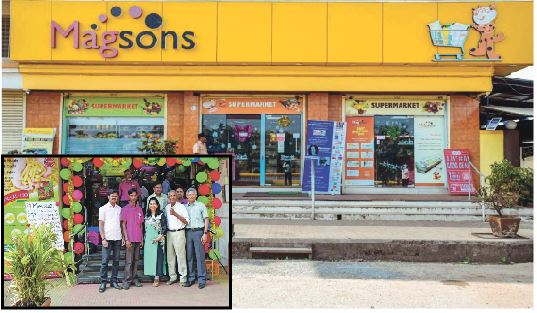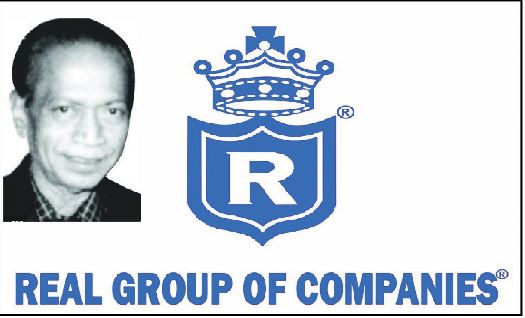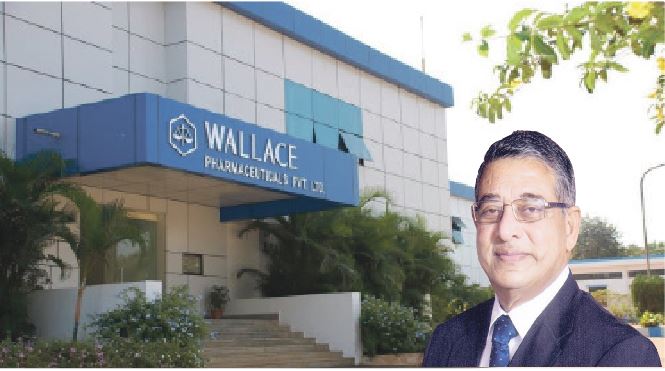HEIGHTS: Cesar Menezes, who inherited Carter-Wallace now known as Wallace Pharmaceuticals, and who took the company to greater heights before handing it over to gen next.
By Rajan Narayan
Unlike the mining lobby, many Goan business houses which were involved in trading faced a crisis when Goa was liberated. It is a tribute to their enterprise and resilience that they managed to set up new enterprises in a wide range of areas from pharma to construction to hospitality to promoting Goa’s state drink feni and even securing a geographical index for it. This part includes the CMM group, the Real group, which is celebrating its 75th anniversary in August, the Monginis and Commonwealth Developers group, retail giants Magsons group, Panjim Inn and heritage hospitality group and in a special way Furtados who have kept the sound of music alive in post-Liberation Goa.
THE first Goan who ventured into consumer goods industries in preference to mining was Pascoal Menezes. Before Liberation Pascoal used to operate one of the largest retail shopping stores in Goa, comparable to today’s malls. Goa was a popular destination for domestic Indian tourists, particularly tourists from Mumbai. The 60s were the Nehru era where import of all luxury goods were banned. To Nehru even Gillette blades and phonograph records and of course, costume jewellery and perfumes were not essential imports.
First three industrial licenses.
In sharp contrast Goa before Liberation was like Dubai. The customs duty on a wide range of luxury products was very low. Which is why unlike in India which was still dependent on the old Ambassador car and the Fiat, even taxis in Goa were Mercedes. Customs duty on watches used to be by weight.
Then overnight everything changed and the ban on imported goods was extended to Goa. Goan firms as in the rest of the country were not allowed to enter into foreign collaboration to manufacture even simple things like shaving cream or blades. Pascoal was very distressed. He rejected the offer of VM Salgaocar, his close friend, to go into the mining business. Pascoal’ss brother David and—- went to New Delhi and managed to persuade the Nehru government that since Goa was liberated 14 years after India gained freedom, there should be some concessions. For the development of the Union territory foreign collaboration was absolutely necessary. They made a convincing case and the CMM group was the first Goan industrial group which got the first three manufacturing licenses.
The first of these was for the manufacture of Old Spice shaving cream with Procter & Gamble. Now only the manufacture of Old Spice is with a part of the CMM family while the marketing is done by Procter & Gamble. The second license was for the manufacture of the Hansaplast bandage to compete with Johnson & Johnson. The third agreement was with Carter Wallace, l an American company, for the manufacture of pharmaceuticals.
The last of the consumer goods factories that the CMM group started was Jorden Dental Care Products Private Limited in the year 1993 in joint venture with Jorden as, Norway to manufacture and market Jorden brand of toothbrushes in the Indian market. In the year 1996 M+C Schiffer GmbH, Germany entered into a joint venture with Menezes to manufacture toothbrushes for Glaxosmithkline in India. In 2011 Jorden exited from this joint venture

The company is now known as Schiffer and Menezes India Private Limited and manufactures and supplies tooothbrushes worldwide and to the Indian market as well.
Mr Cedric Menezes, the youngest son of late Mr Pascoal Jose Menezes is the owner and the Managing Director of the company.
GAJANAN SHIRODKAR REAL GROUP
The second most important pioneer to enter the consumer industry was Gajanan Shirodkar who started the Real group of industries. The young Gajanan from Shiroda came to Panaji and started the iconic Real Café, which coincidently celebrates its 75th anniversary in August 2022.
Real also manufactures a wide range of wines including special wine called Real Champagne. The sparkling wine with the flavour of champagne was very popular. I remember that on my visit to Goa in 1978 with a group of journalists to study the Ramponkar agitation, all of us brought crates of the Real Champagne which came in soda bottle size. The growth of the Real group suffered a setback when the eldest son Dilip tragic death. In his memory the group is still called the Dilip Shirodkar group.
Even when he was his village, he had dreams of building a large business empire and providing employment to the large number of fellow Goan. The difference is that unlike others who only dream and talk, Gajanan had the imagination and the courage to fulfil his dreams.
Coming from a village and achieving his dream was a challenge. But Gajanan believed that nothing was impossible. He came to Panaji with his brothers and the first business venture he started was the Café Real. This is followed by Agencia Real which was started in 1946 a year before Indian independence. The name REAL was coined by Gajanan Shirodkar for his group of industries. Gajanan was very dedicated to Goans and Café Real was known for Goan snacks and was very popular with the local people. The favourites were the traditional Goan mirchi, the batatwada, the patalbhaji and the unique saffron colour sheera which had genuine saffron. Real continues to attract people from all walks of life from politicians to lawyers to tiatrists to local businessmen. I recall going to Real for the first time with my then Patrao the late JD Fernandes who was responsible for converting OHeraldo from a little read Portuguese paper to the most influential English daily. Like Gajanan, JD Fernandes was a humble man with a big dream.

Like other businessman like Pascoal Menezes, before Liberation, the Real group also used market a wide range of imported luxury goods. The marketing genius of Gajanan was dramatized by his keeping expensive Swizz watches in a fish tank to prove that they were waterproof. Like other trading houses, Real also had to change its business model after Liberation when imported goods were banned in the Nehru era.
Gajanan reacted to this challenge by setting up a soft drink bottle unit under Manik, which was his mother’s name whom he used to adore and respect a lot. He also set up a distillery to make hard drinks and a wide range of wines. Among the most popular was the range of sparkling lines which likes soft drinks had a fizz and was called Real Champagne. Gajanan also supplied drinking mineral water.
Gajanan G Shirodkar’s management was unique. Real group was considered a university of business by not only the employees but other business houses. The tall 6-foot Gajanan had an impressive personality. He was very warm-hearted with a tremendous talent for making friends. He was very popular with the business community in Panaji for his helpful nature. I recall meeting him for the first time at the headquarters of the Real group in the Mascarenes building from whete the Real group still functions.
Real group completes 76 years on 28 August, 2022. This marks the diamond jubilee of the company which will be Diamond Jubilee annivesary of the company. It is the Amrit Mahotsav of the company which was set up just before India won independence. Keeping with tradition the anniversary begins with a mass at the Mary Immaculate church. This is followed by a get-together of all the employees.
Vinod Shirodkar’s contribution is the berry drink Kane named after his pet dog. It is a kind of lovely pink health drink. Vinod looks after the soft drinks business. Real has had a monopoly on the distribution of Kingfisher beer for the last 57 years. The Real group suffered a setback when the eldest son Dilip Shirodkar died early due to health problems. Dilip had played a major role in expanding the empire created by his father. In his memory the group is called the Dilip Shirodkar Real group of companies. The day-to-day management is run by Vinod Shirodkar who had a PhD in law from the Salgaocar Law College on patent law. Real has had a monopoly over the distribution of kingfisher beer for more than five decades. Rajesh Shirodkar and Vinod Shirodkar now look after the Real group of industry.
Real group of companies deal with different types of commercial as well as non-commercial activities like manufacturing, wholesale , retail business of beverages and other types of goods and services as well as hospitality businesses. They have a strong sense of social commitment and extend help to schools and student events. They also support promising sports persons. Public cause events are also supported like modelling programs held in Goa over Christmas and New Year, etc .
The Real group was a pioneer in reviving the Goan carnival after Liberation. I recall that the King Momo float designed by Francisco Martin which was sponsored by Real group, the Real group has also been supporting the Bonderam festival, and even the International Film Festival ever since Goa became the permanent venue of IFFI.
“The company motto is to build up its reputation and goodwill by contributing the best to its customers as well as the society at large.”
Late late Dilip G Shirodkar (Bhai) played an important role in the development of this group. The present directors are Rajesh Shirodkar, Vinod Shirodkar and Harishchandra Shirodkar.
MANGOLA AND MONGINIS
Among the earliest bottlers of soft drinks is the Margao-based Datta Damodar Naik, who used to bottle the very popular Mangola for which he had the franchise. Datta Naik is also a leading builder who started the Commonwealth Developers company. Datta secured the franchise from the well-known Mumbai bakery chain Monginis for Goa and North Karnataka and which now has more than a hundred outlets. Datta Naik has his own factory in the Verna Industrial Estate which makes a wide range of bakery products under Goa franchise for the popular Monginis chain. It is a long, long way to come from the days his great, great grandfather Sukdo used to sell coconuts to feed his family.
NAVTARA AND POSHAK
We must take note of the new entrepreneurs who have a major presence now in the retail sector. This includes the Tavora brothers who owned between them the Navtara pure vegetarian restaurants, the Poshak textiles outlets and Walkover which sells toys. Navtara, in fact can be called the first Goan Udipi restaurant started way back in 1986 by a Goan Catholic businessman and now has branches in several of Goa’s urban cities.
The Navtara chain was started by Carlos Tavora. The Poshak group started by Luis Tavora has branches in other parts of Goa too. Walkover is a stand-alone unit started by Francisco Tavora — a former judge who is a special prosecutor for the State in the Tarun Tejpal case.
We cannot ignore the big boss. The Big Boss of Goa is not Salman Khan who runs the popular show but Mac Vaz. Captain Mac Vaz, a former army officer, was asked by his father, popularly known as “Mr Baker” to leave the army to look after the family business. Mr Baker, the iconic bakery of capital city dates back to 1922 and is the iconic bakery of capital city Panaji. But Mac’s heart is in feni and he has brought all the aggressiveness that he displayed as a solider, to the business of feni. Not only is Big Boss the largest selling brand of feni, Mac has fought to get feni geographical index. This means that no other state except Goa can use the word feni for any similar drink distilled or bottled. This is like scotch being identified with Scotland.
AJIT SEQUIERA PANAJI IN
The other second generation entrepreneur is Ajit Sukija, the grandson of Dr Jack Sequeira, Father of the Opinion Poll. Ajit has been running the first heritage hotel and restaurant Panjin Inn in the now declared heritage zone Fontainhas. He also takes tourists on a tour of his farm where he has a caju estate and a feni distillation plant for the manufacturer of feni in the traditional fashion. The caju or cashew fruit is stomped on by tourists who at the end of the tour can enjoy fresh neero (the non-alcoholic juice of the cashew fruit) along with Goa delicacies.
KIRIT NOW HAS STARBUCKS
If Starbucks has come to Goa it is thanks to Kirit Maganlal, who inherited the original Magsons Supercenter from his father Jaysinh Maganlal. Jaysinh was a great sports enthusiast and was the secretary of the Panjim Gymkhana. In good health and not so good health till the last he would be greeting customers at the old Magsons Supercenter at the Campal promenade. Kirit, a former table tennis champion, married Andrea (an educationist and counsellor) and expanded the Magsons chain of supermarkets with branches in Caculo Mall, Mapusa and Margao and even at petrol pump outlets. Goa’s first supermarket chain is Magsons.
The old Magsons Supercenter at Campal was razed and in its place now is the multi-storeyed Magsons Towers with Starbucks, the famous international coffee chain as the ground floor attraction. A band new Magsons Supercenter is will soon be opening alongside in a new avatar. The unique contribution of Kirit Maganlal to the supermarket business is his readymade food unit where you can get both Goan and International delicacies which are ready to eat. Kirit’s grandfather Maganlal Monji Canji came from Africa to settle in Goa in the early 1920, the family were pioneers of a vast business empire before Liberation.
FURTADO PRESERVES SOUND OF MUSIC
The sound of music was promoted by Goa by the Furtado chains of outlets which supplies musical instruments. The speciality of Furtados is the organ both the grand organ and the baby grand. In the past every Catholic home used to have an organ. The Furtado family which started its original outlet in the Dhobi Talao area in Mumbai also offers facilities for learning music. From the guitar to the drums every musical instrument is available at the Furtado outlets.
The two others sons and daughters of the soil who have achieved great success are Neomis who set up a chain of beauty parlour along with her husband both of whom are veteran hair stylists. There is also the Norbert group which runs Goa’s largest professional chain on the gymnasium. The oldest gymnasium is of course is Basilios.
